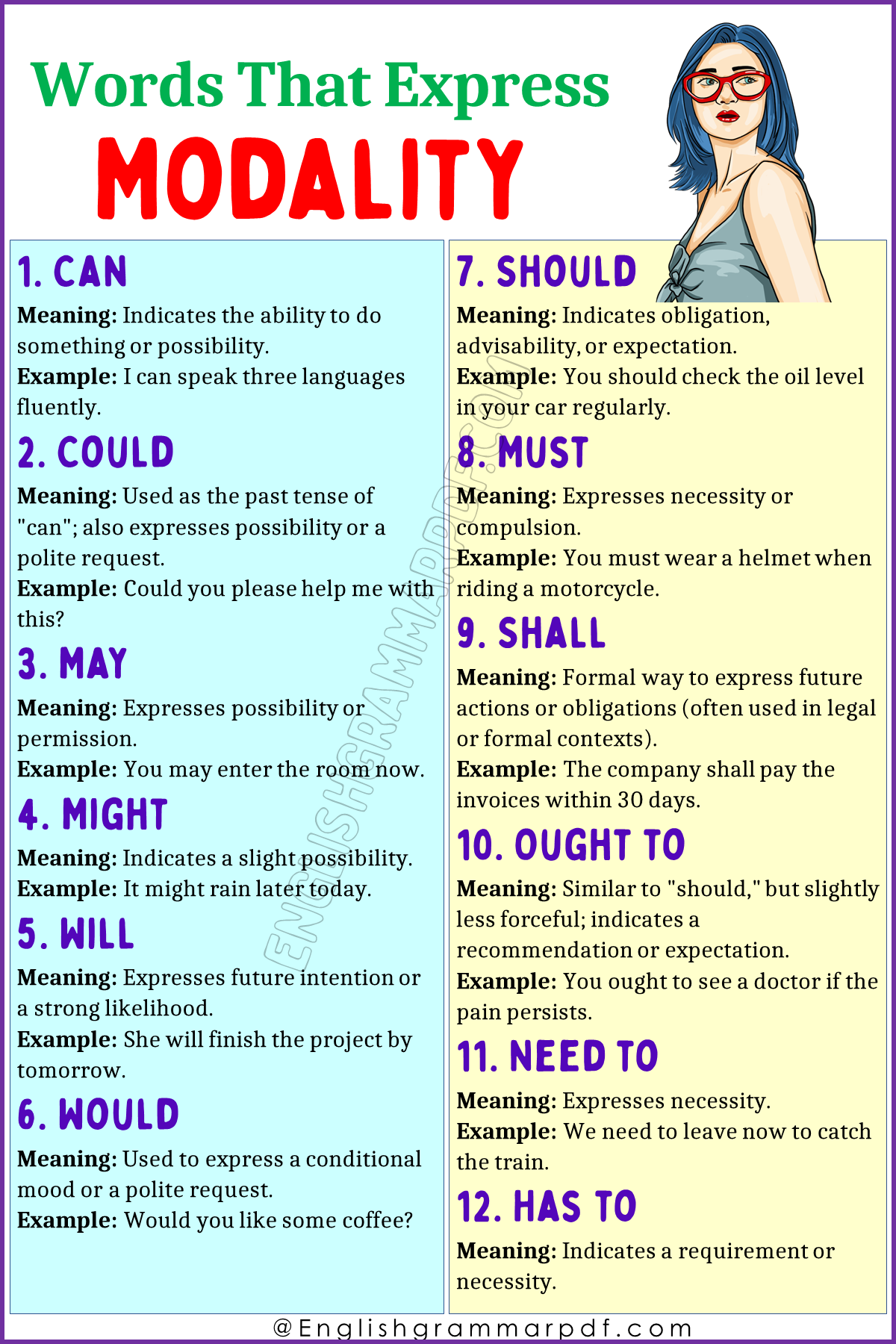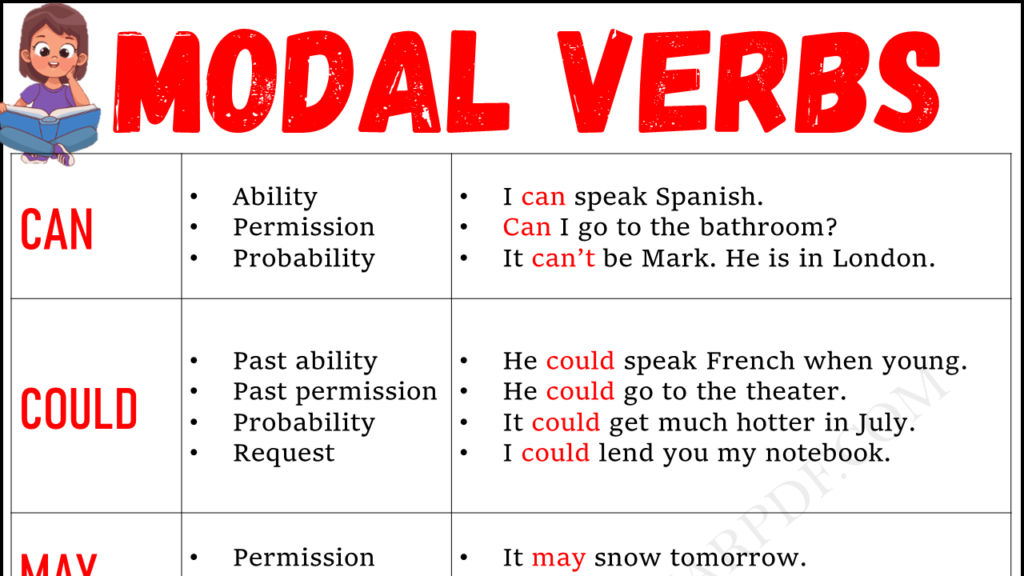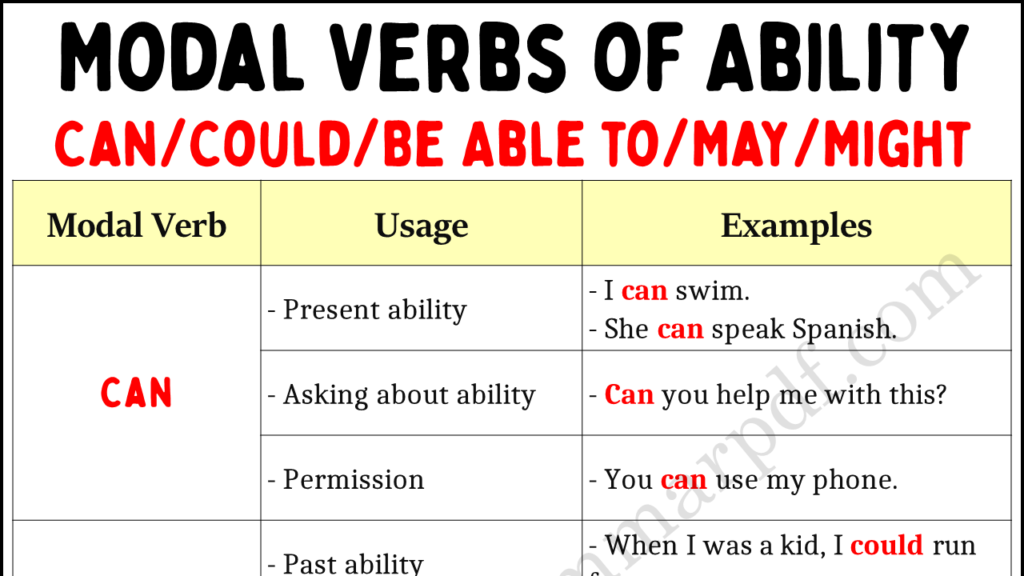When it comes to expressing certainty, possibility, or necessity in language, modality is a key concept. Modal words help us communicate not just what we think, but how we feel about what we’re saying. These words infuse our statements with shades of probability, obligation, or permission, making our communication richer and more nuanced. This blog post explores 30 essential modal words, each defined and exemplified to help you grasp their use and integrate them into your daily language effectively.
List of Words That Express Modality
Here is the words that Express Modality;
- Can
- Could
- May
- Might
- Will
- Would
- Shall
- Should
- Must
- Ought to
- Need to
- Has to
- Have to
- Dare
- Needn’t
- Mightn’t
- Couldn’t
- Wouldn’t
- Isn’t likely to
- Is supposed to
- Is able to
- Is bound to
- Seems
- Appears
- Is possible
- Is probable
- Is certain
- Is necessary
- Is permitted
- Is required
Words to Express Modality
1. Can
Meaning: Indicates the ability to do something or possibility.
Example: I can speak three languages fluently.
2. Could
Meaning: Used as the past tense of “can”; also expresses possibility or a polite request.
Example: Could you please help me with this?
3. May
Meaning: Expresses possibility or permission.
Example: You may enter the room now.
4. Might
Meaning: Indicates a slight possibility.
Example: It might rain later today.
5. Will
Meaning: Expresses future intention or a strong likelihood.
Example: She will finish the project by tomorrow.
6. Would
Meaning: Used to express a conditional mood or a polite request.
Example: Would you like some coffee?
7. Shall
Meaning: Formal way to express future actions or obligations (often used in legal or formal contexts).
Example: The company shall pay the invoices within 30 days.
8. Should
Meaning: Indicates obligation, advisability, or expectation.
Example: You should check the oil level in your car regularly.
9. Must
Meaning: Expresses necessity or compulsion.
Example: You must wear a helmet when riding a motorcycle.
10. Ought to
Meaning: Similar to “should,” but slightly less forceful; indicates a recommendation or expectation.
Example: You ought to see a doctor if the pain persists.
11. Need to
Meaning: Expresses necessity.
Example: We need to leave now to catch the train.
12. Has to
Meaning: Indicates a requirement or necessity.
Example: He has to finish his homework before he can go out.
13. Have to
Meaning: Similar to “must,” expresses necessity.
Example: I have to attend the meeting at five.
14. Dare
Meaning: To have the courage to do something (often used in questions or negative forms).
Example: I dare not ask him about it.
15. Needn’t
Meaning: Indicates a lack of necessity.
Example: You needn’t worry about me; I’ll be fine.
16. Mightn’t
Meaning: Indicates a slight possibility that something won’t happen.
Example: You mightn’t find it interesting, but it’s worth a try.
17. Couldn’t
Meaning: Past negative form of “can”; indicates impossibility.
Example: I couldn’t hear what they were saying.
18. Wouldn’t
Meaning: Past negative form of “will”; indicates refusal or improbability in the past.
Example: She wouldn’t accept the offer, despite the benefits.
19. Isn’t likely to
Meaning: Indicates low probability.
Example: He isn’t likely to come due to the heavy snow.
20. Is supposed to
Meaning: Indicates expectation or intended purpose.
Example: You are supposed to wear a uniform at work.
21. Is able to
Meaning: Indicates capability.
Example: She is able to solve complex problems quickly.
22. Is bound to
Meaning: Indicates an inevitable action or outcome.
Example: If you work hard, you are bound to succeed.
23. Seems
Meaning: Suggests a perceived condition or appearance, often reflecting uncertainty.
Example: He seems tired today.
24. Appears
Meaning: Similar to “seems”; used to describe how something seems based on visible evidence.
Example: It appears to be broken.
25. Is possible
Meaning: Indicates that something can happen.
Example: It is possible that the conference will be postponed.
26. Is probable
Meaning: Indicates that something is likely to happen.
Example: It is probable that they will arrive late.
27. Is certain
Meaning: Indicates absolute certainty or inevitability.
Example: It is certain that the sun will rise tomorrow.
28. Is necessary
Meaning: Indicates something essential or inevitable.
Example: It is necessary to have a passport to travel internationally.
29. Is permitted
Meaning: Indicates allowed actions or behaviors.
Example: Smoking is permitted only in designated areas.
30. Is required
Meaning: Indicates a condition that must be fulfilled.
Example: Participation in the training program is required for all new employees.



